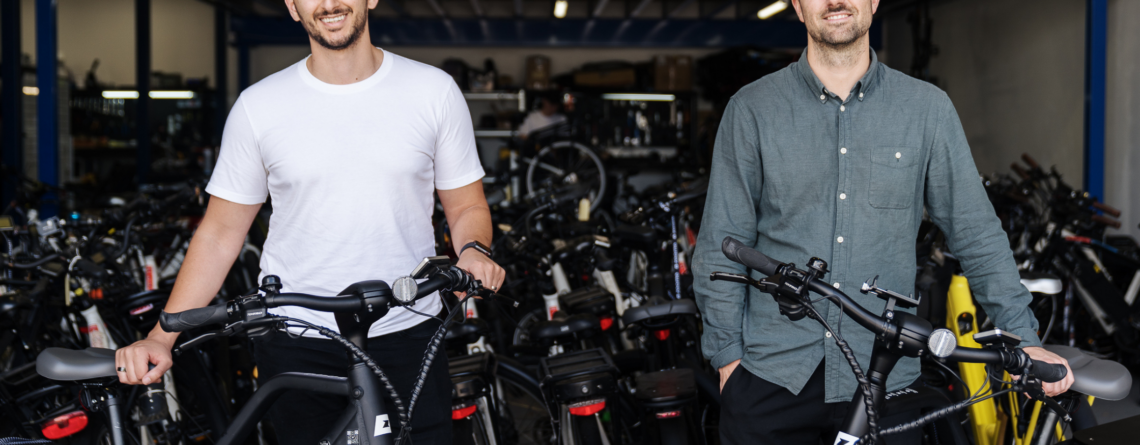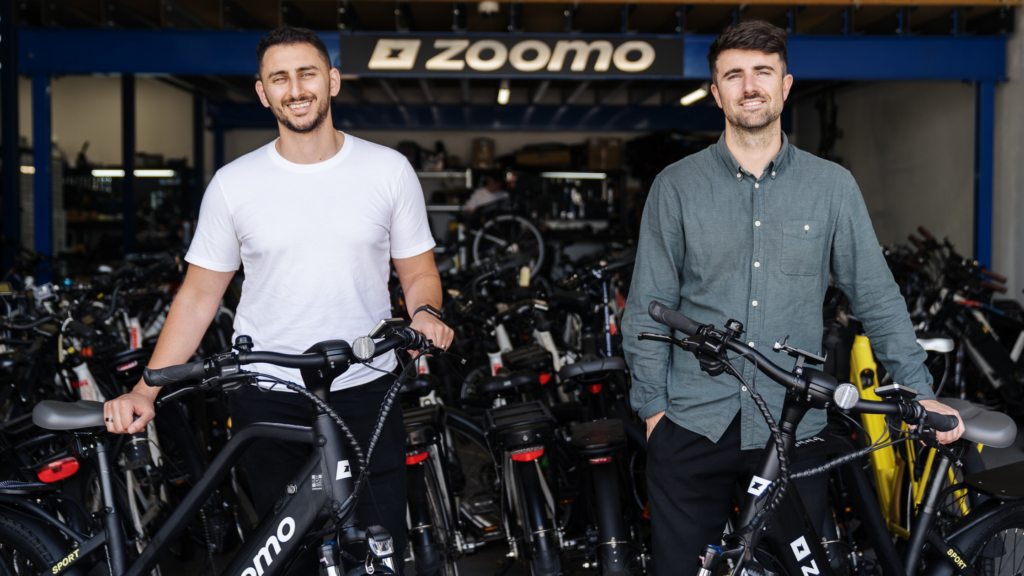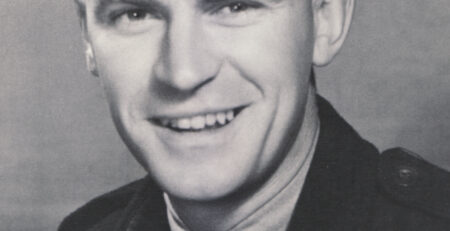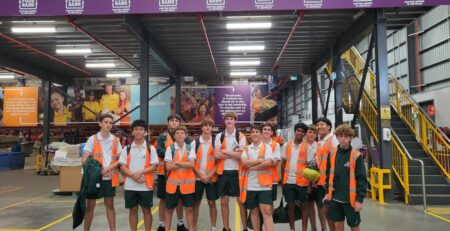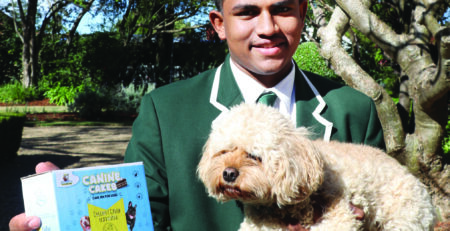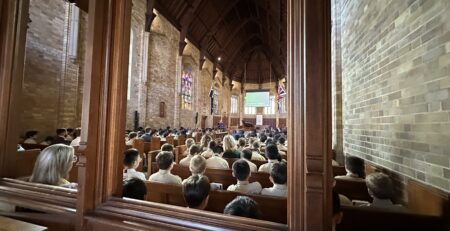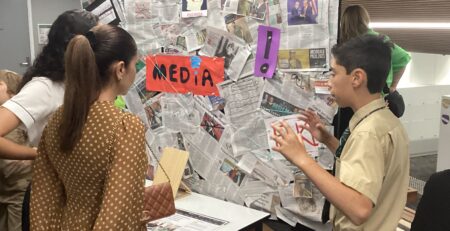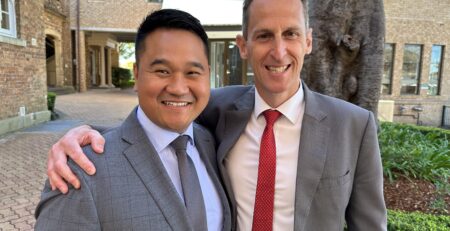The big wheel powering a global success story
“I’m still riding on the habits formed at school”
It started as a “side hustle”. Five years later Mina Nada’s electric bike company Zoomo has gone global, expanding to seven countries and attracting $100 million in investment to fuel further growth.
The Trinity old boy (Class of 2006) is a busy man, and credits the strict regimen of his school days for the productive way he deals with that in his business.
“I often think I was more disciplined at school than I am today. I’m still riding on the habits that were formed at school,” he said.
“When you look back it was pretty intense. You wake up early every day, you can’t afford to miss the bus, you’re at school all day, then there’s homework, sport, packing your bags… there was Saturday sport, too, and weekend study.
“It was pretty gruelling, but that experience was what put me in good stead; it helped me form good habits.”
That’s why his advice to current students is to “go with the school flow”.
“It’s easy to push back but there’s no better time to follow the guidance and advice you are given. You’ve got plenty of time to make bad decisions later on.”
He was a consistent achiever ever since starting at Trinity in Year 3, winning accolades regularly in German, Geography, English, Debating, Christian Studies, and Science. He was a prefect, captain of Henderson house, and rose to the highest cadet rank of CUO (cadet under officer).
He is grateful for Trinity’s insistence on versatility, particularly being forced to play sport.
“I probably average as much exercise today as I did in high school. We were forced to train twice a week and play sport on Saturdays. I wouldn’t have done it unless I was forced to.
“Whatever good, healthy habits I’ve got today I’m sure are part of that discipline that started at school.
“I also value the roundedness that Trinity insists on, as well as the open-mindedness.
“Trinity was clear in its convictions, in the way they taught virtue and ethics, and right from wrong. But it also had a broad enough teacher base that taught different ideas and came from different world views, and that I think is very important for getting along in life.”
His own parents, both doctors who came to Australia from Egypt in the 1980s, were part of that broad base.
“Their story is inspirational to me. They came here with nothing and knowing no-one, and made a life for themselves.
“They took big risks and that encouraged me to realise I had a big safety net that they didn’t have. And that I should definitely be taking risks and doing more with myself.”
His father trained as a tailor in case his qualifications weren’t recognised in Australia; luckily the credentials of both of his parents were accepted.
Luck is part of the life equation he readily acknowledges.
“I don’t think you can take yourself too seriously. You can’t control external factors, and so ultimately can’t control your outcomes. You’ve got to accept there is a lot of luck involved, a lot of chance.
“I was very fortunate to have parents who could afford to send me to Trinity, and to have a lot of opportunities that were driven by circumstance and fortune. Always remember, whatever you’ve got can be taken away in a moment.”
He was particularly fond of Cadets.
“It was a lot of fun, a bunch of kids put out in the forest and told to look after themselves – pretty crazy when you think about it. We still had adult supervision but we were responsible for making a lot happen, for having to manage and lead and inspire.
He was a hard worker at school, and got used to it. “Right now I think I would like to fast-forward to a world where I was just chilling on the beach,” he said, “but I imagine that’s not what it’s cracked up to be.”
He described himself as practical and competitive.
“I think I was a pain in the butt to teachers because I used to argue about marks.”
He feels he benefitted from the Trinity ethos of friendly competition and mutual encouragement.
“I was fortunate to have a bunch of friends who were all very talented and doing a lot of cool things, and they motivated me. I’m a competitive person and I kept busy trying to achieve the most that I could.”
One good friend from all the way back in Year 3 is Kevin Shah, a former Archer captain and school vice-captain, who is working at Goldman Sachs in New York; Paul Towers, a former IB dux, is a professor of classics at one of America’s Ivy League schools.
Mina studied law and languages at Sydney University. He won a scholarship to study in Germany, and interned at a big law firm. “That helped me get my foot in the door with other professional opportunities.”
He co-founded Zoomo while he was an executive at online food delivery company Deliveroo, teaming up with former Bain & Company colleague Michael Johnson.
“I could see the fastest people making deliveries were on bikes but there were only a handful of them. The bikes were expensive, went through heavy duty use, needed servicing, needed financing, and needed software to manage large fleets.
“I could see the future wasn’t going to be all about cars; it was going to be about smaller, more efficient, faster vehicles that were more fit for purpose.
“Our company started as a side-hustle to be honest, just an idea. We started buying bikes and renting them out, testing the pricing and servicing needed. It was not until 2019 that we decided to drop our day jobs and go full time, and raise more capital. It was a side-hustle until it couldn’t be any more.”
In addition to Australia, Zoomo now operates in Canada, the US, Britain, France, Germany, and Spain, with some 10,000 bikes out in the field.
Zoomo makes and sells e-bikes designed for delivery drivers, to individual gig economy workers as well as large fleet operators. It’s the world leader for electric “last-mile delivery” vehicles.
In 2022 it raised over $US100 million in funds from investors including
Atlassian founders Mike Cannon-Brookes and Scott Farquhar, as it rode the wave of rampant growth in the home delivery food and grocery market.
“Our goal is to put more efficient, safe and clean transport solutions on our roads,” he said.
“We see a world within the next decade where every last-mile delivery will be completed on light electric vehicles supported by the Zoomo ecosystem. “In 2030 our roads will look dramatically different as sustainable transport quickly overtakes diesel and gas-fuelled modes of transport. Our sidewalks will be wider, delivery vehicles will be fully electric, pedestrian only roads will become commonplace, more electric bikes will occupy our roads, priority roads and lanes will be designed for efficiency and traffic will become a thing of the past.”
Some Zoomo models can reach distances of 80 kms on one charge at speeds of up to 25 kph. They can travel from Bondi to Circular Quay in 22 minutes while using just 13 per cent of their charge.
Mina owns a road bike, an electric bike, and a motorbike but, unlike his wife Adelina, no car.
“I’m trying to get her onto a bike, too,” he says.
This article originally appeared in our July Edition of Trinity News.
Request a physical copy of Trinity News or view our online digital bookshelf.

